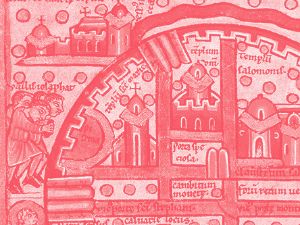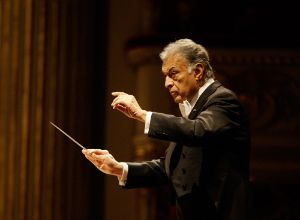Concert | Visiting orchestras / Arnold Schönberg / Gustav Mahler
The Israel Philharmonic Orchestra
Visiting: Israel

City plan of Jerusalem, book painting 12th century © Wikimedia Commons
Music was their salvation. Eighty years ago, violin virtuoso Bronisław Huberman, politically an engaged pan-European, founded a symphony orchestra in British mandated Palestine. Musicians persecuted by the Nazis who could no longer – or no longer wished to - stay in Europe found a new field of action there. The criteria were strict, the rehearsals hard, the orchestra was to maintain the highest international cultural standards that the Nazis had begun to destroy. On 26 December 1936 Arturo Toscanini conducted the first concert of the Israel Philharmonic Orchestra, as it is known today. The ‘Orchestra of the Exiles’ operated without a chief conductor for forty years. Prior to that, internationally renowned conductors who felt united with the orchestra took over the conceptual work and the conducting.
In 1977, Zubin Mehta took on the role of music director after serving as “musical advisor” for nine years, and in 1981 was given a lifetime appointment. His Mahler interpretations continue to provide a standard to be measured against, his early recording of Schönberg’s Chamber Symphony No. 1 is still considered a referential recording. In Mahler’s final and Schönberg’s first symphonic work, both start and conclusion are interlocked, indicative of the power of resilience in a tradition in which Jewish knowledge, thought and organization play a crucial role.
Arnold Schönberg [1874–1951]
Kammersymphonie Nr. 1
für 15 Soloinstrumente op. 9 [1906]
Gustav Mahler [1860–1911]
Symphony No. 9 in D major [1909]
1. Andante comodo
2. Im Tempo eines gemächlichen Ländlers
3. Rondo-Burleske / Allegro assai
4. Adagio

Zubin Mehta
© Marco Brescia
A Berliner Festspiele / Musikfest Berlin event